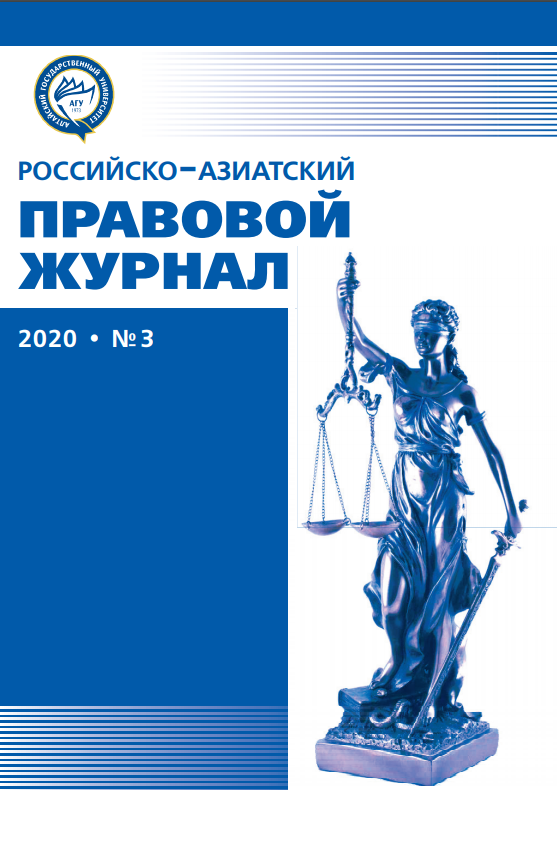THE PROBLEM OF “IDENTITY THEFT” IN RUSSIAN LAW
УДК 34.09 ББК 67.0
Abstract
All spheres of society are being computerized and robotized. Legislation and the application of law areno exception. This phenomenon has been developing abroad for a long time. It has acquired its own stablename — “legal tech”. However, it is not easy to implement this idea. The introduction of a procedure for“digital identification” of people to record their presence on the site is inevitable. Otherwise, the user remainsunauthorized, which means “invisible” to other users. This makes it impossible to conclude contracts on theInternet.The article describes the problem of theft of personal data of citizens via the Internet, which is called“identity theft”in legal science. The analysis of preventive measures in different countries is carried out.The authors consider the theories of personal data protection and propose measures to improve the legal framework. This category is considered as the “right to be forgotten” and the possibility of its implementationin Russian reality. We offer solutions to the gap aspects of personal data protection.
Downloads
References
2. Bouhadana I. Le droit au respect de la vie privee a l’ere du numerique dans le systeme francais // Эволюция государственных и правовых институтов в условиях развития информационного общества. М., 2012. С. 135–153.
3. Закон о конфиденциальности и безопасности персональных данных 2014 года. URL: http://www.congress.gov/bill/113thcongress/senate-bill/1897.
5. Act №78–17 of 6 january 1978. On information technology, data files and civil liberties. URL: http://www.cnil.fr/fileadmin/documents/en/ACT78–17VA.pdf.
6. Lunn Lopucki. Human Identification theory and the identity theft problem. SSRN Electronic Journal. 2001. May. №80 (1).
7. О защите физических лиц при обработке персональных данных и о свободном обращении таких данных: Директива №95/46/ЕС Европейского парламента и Совета Европейского союза (принята в Люксембурге 24.10.1995) // Official Journal of the European Union. № L 281. 23.11.1995. С. 731.
8. Хартия Европейского союза об основных правах (2007/С 303/01) (Вместе с «Разъяснениями…» (2007/С 303/02)) (Принята в Страсбурге 12.12.2007) // СПС «КонсультантПлюс».
9. Об информации, информационных технологиях и о защите информации: Федеральный закон от 27.07.2006 №149-ФЗ // СЗ РФ. 2006. №31 (ч. I). Ст. 3448.
10. Апелляционное определение Московского городского суда от 08.02.2017 по делу №33– 5031/17 // СПС «КонсультантПлюс».
11. Google Spain SL and Google Inc. v. Agencia de Datos (AEPD) and Mario Costeja Gonzales [C-131/ 12CJEU] (Большая Палата) // Бюллетень Европейского суда по правам человека. Российское издание. 2014. N 9. С. 22–23.
12. Как суды и Роскомнадзор определяют, что является персональными данными, а что нет? URL: https://zakon.ru/blog/2020/5/24/-kak_sudy_i_roskomnadzor_rkn_opredelyayut_chto_yavlyaetsya_ personalnymi_dannymi_a_cht_net.
Russian-Asian Law Journal is a golden publisher, as we allow self-archiving, but most importantly we are fully transparent about your rights.
Authors may present and discuss their findings ahead of publication: at scientific conferences, on preprint servers, in public databases, and in blogs, wikis, tweets, and other informal communication channels.
Russian-Asian Law Journal allows authors to deposit manuscripts (currently under review or those for intended submission) in non-commercial, pre-print servers such as ArXiv.
Authors who publish with this journal agree to the following terms:
- Authors retain copyright and grant the journal right of first publication with the work simultaneously licensed under a Creative Commons Attribution License that allows others to share the work with an acknowledgement of the work's authorship and initial publication in this journal.
- Authors are able to enter into separate, additional contractual arrangements for the non-exclusive distribution of the journal's published version of the work (e.g., post it to an institutional repository or publish it in a book), with an acknowledgement of its initial publication in this journal.
- Authors are permitted and encouraged to post their work online (e.g., in institutional repositories or on their website) prior to and during the submission process, as it can lead to productive exchanges, as well as earlier and greater citation of published work (See The Effect of Open Access).








